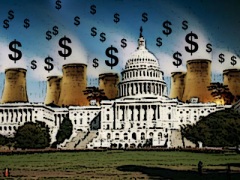Cap and Trade: Polluting is allowed so long you pay the banksters
June 18, 2010
Kerry and Lieberman want the industry to pay bankers a fee for emitting. In other words, they want to legalize unlimited pollution. The results will be an end to industry at the local and regional levels, with massive, worse than ever before emission for anyone who can pay the new tax (Transnational Corporations). The bill presented in May will also regulate how much energy citizens can use. It will also pursue the same failed green policies Spain is now abandoning.
CNSNews
Senators John Kerry (D-Mass.) and Joe Lieberman (I-Conn.) said they are not worried that their cap-and-trade plan might harm

The Cap-and-Trade scheme is part of the largest transfer of money and resources from the poor and the middle class to the corporate Lords.
fellow Democrats going into the November elections, at a time when voters are more concerned about bread and butter issues such as the economy and the 9.7 percent unemployment rate.
The bill, the American Power Act, was unveiled in May and would establish a nationwide cap-and-trade system that would regulate the amount of carbon dioxide emitted into the atmosphere. In exchange, the bill would also extend various tax subsidies and credits in an attempt to make renewable energy sources relatively affordable.
Cap and trade basically means that a ceiling, a cap, would be placed on certain carbon-emitting manufacturers who would be allowed to exceed that cap if they purchase carbon credits (trade), the proceeds of which would be invested in alternative energy after the government collected a portion of those proceeds. (Some analysts describe the plan as “cap and tax.”)
CNSNews.com on Tuesday asked Sens. Kerry and Lieberman whether they were concerned that pushing such a low-priority issue so close to an election would reinforce the perception that Congress and its Democratic leaders were out of touch with the American people. (Lieberman, though an Independent, is a former Democrat who now caucuses with the Democrats in Congress.)
Lieberman acknowledged that the public is concerned with fiscal issues: “Deficit, debt is on the minds of the voters,” he said. “The American Power Act has been constructed to be deficit-neutral [and] we’re going to get the CBO analysis later this month or early next month.”
Kerry went on at length, saying that Americans support many of the provisions in his bill: “When you put the worst arguments characterizing our legislation against the best arguments for energy independence — for jobs, for health, and cleaning up the environment — overwhelmingly Americans land on the side of a comprehensive bill,” said Kerry.
Kerry said that the debate going forward will not be about convincing the public of the veracity of global warming claims, but about trying to redefine cap and trade legislation as something that will benefit the struggling economy.
“Nothing that we do with respect to this bill rides on persuading people ultimately about climate [change],” Kerry said.
“Do Americans want to say no to anywhere from 250,000 to 540,000 jobs a year for the next 10-20 years? I don’t think so,” said Kerry. “Do Americans want to let China take the lead in solar and wind technologies that we invented? I don’t think so. This is about getting America into the marketplace. This is a $6 trillion market with 6 billion potential users.”
Kerry and Lieberman, in an apparent nod to voters’ fiscal concerns, may have a steep hill to climb in convincing the public that their economic plan will lead to a better economy.
Polls show that Americans are not particularly taken with the issue of global warming, the driving force behind the Kerry-Lieberman effort. A March 2010 Gallup survey, for example, found that 48 percent of Americans thought that global warming claims were exaggerated.
That same survey found that 67 percent of Americans thought that global warming would not pose a serious threat to their well-being in the future.
Polls also have shown that global warming does not rank high on Americans’ list of concerns. An April 2010 Gallup survey found that Americans ranked environmental issues and global warming last when asked which issues they thought were the most important in determining how they will vote in November 2010.
Only 46 percent of Americans said that global warming was either “extremely” or “very” important to their voting decisions. By contrast, 93 percent said the economy was either very or extremely important to their voting choices. In fact, the economy was the only issue of the seven polled that a majority of voters, 53 percent, called extremely important to their voting decision.
Global warming was ranked as extremely important by only 22 percent of respondents.
The same March 2010 Gallup survey that showed skepticism of global warming also found that only 30 percent of the public thought that energy and climate legislation would either probably or definitely help the economy. Among those, only six percent thought federal legislation would definitely help.
Conversely, 48 percent thought that federal climate and energy legislation would either definitely or probably hurt the economy. The percentage of Americans who thought that federal energy legislation would either probably or definitely hurt the economy actually rose from one year ago, the survey found, while the number of people who thought the legislation might be beneficial declined.
 the US, like their brethren in Greece, have been living the good life for far too long and must accept a drastic and permanent reduction in their living standards.
the US, like their brethren in Greece, have been living the good life for far too long and must accept a drastic and permanent reduction in their living standards.